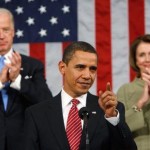How Do You Put a SOTU Together?
 How do you decide what goes into a State of the Union speech and what is unnecessary padding?
How do you decide what goes into a State of the Union speech and what is unnecessary padding?
Combine one part Speech from the Throne. One part campaign ad. And one part Oscar Night. That’s the formula for a presidential State of the Union address.
While working in the Bush White House, I had the opportunity to work on two such addresses, in 2001 and 2002. (The Feb. 27 2001 address to a joint session of Congress did not actually carry the title “State of the Union,” but it functioned as one despite its humble self-description as a mere “Economic Message.”)
A State of the Union consumes the entire executive branch. Every department and agency of government competes to insert its pet project into the speech. “We have to say something about our farm program.” “Don’t forget space exploration.” “We have a great story to tell about disaster relief.”
Meanwhile, the White House struggles to impose some kind of unitary theme or message — and to insert some kind of memorable phrase or line that will generate positive headlines.
Usually, the struggle ends in failure. At the first meetings on the State of the Union in November, somebody — maybe the president himself — will usually say: “We don’t want to do just another shopping list.” After two, three, sometimes four months of hard work, what emerges is … a shopping list.
And you know what? It turns out that the viewers at home like shopping lists. President Clinton’s States of the Union were almost universally condemned by journalists and communications professionals as sloppy monstrosities. Too long, too shapeless, just one damn thing after another. Yet after each , Clinton’s numbers would surge. People liked the big formless blob speeches, despite their frightening length: 77 minutes in 1998, 79 minutes in 1999, 85 minutes in 1995, 89 minutes (the all-time record!) in 2000. The longer the speech, after all, the more likely you are to hear something that directly concerns you.
Thus, Clinton in 2000: “My budget includes a $110-million initiative to promote economic development in the [Mississippi] Delta, and a billion dollars to increase economic opportunity, health care, education and law enforcement for our Native American communities.” Pause for applause from residents of the Mississippi Delta and Native American communities.
George W. Bush’s speeches tended to be shorter and more tightly focused than Bill Clinton’s, but Barack Obama is reverting to the previous form. He spoke for 69 minutes in January 2010. Unlike Clinton’s, however, Obama’s speeches have not effectively mobilized support for the president’s agenda. That may be due to the dire economic conditions in the United States. Or it my be due to a certain unappealing quality of scolding and complaint to which Obama sometimes succumbs.
Thus, Obama in 2010: “The more that TV pundits reduce serious debates to silly arguments, big issues into sound bites, our citizens turn away. No wonder there’s so much cynicism out there. No wonder there’s so much disappointment. I campaigned on the promise of change. Change we can believe in, the slogan went. And right now I know there are many Americans who aren’t sure if they still believe we can change or that I can deliver it. But remember this: I never suggested that change would be easy or that I could do it alone.”
My main suggestion for Obama in 2011 would be: Don’t forget the importance of delivering positive news. America’s normal ebullient self-confidence has sagged in this recession. Almost half of Americans now (falsely) believe China to be the world’s leading economy. Not even one-third (correctly) credit the United States. (America’s economy is in fact three times larger than China’s, and Americans annually file 20 times as many patents as the Chinese.)
But you know, like the old cart horse when it hears the milk truck roll by, I can’t help but prick up my ears at this season of the year and think in longer form about what the president more specifically ought to say. I wrote those thoughts out in long form in the February issue of Esquire magazine. (For some crazy reason, the editors put a photograph of a nearly naked Brooklyn Decker on the cover instead.) You can read it online, after this opening apologia, on which I will conclude this column:
“It’s a weird feeling of gender bending to imagine writing a major speech for a president of a different party. It’s tempting to treat the whole exercise as a joke: ‘First of all, I’d like to express my apologies to [Israeli] Prime Minister Netanyahu for treating him so rudely.’ Or — worse — you insert into the president’s mouth words that he’d never say, and the whole thing degenerates into political wish fulfillment. Yet there can be a real purpose in the exercise. After the Democratic defeat of November 1994, President Clinton telephoned the neo-conservative Democrat Ben Wattenberg and wondered aloud how he’d ended up the manager of the government, and not the leader of the country. That one question propelled President Clinton’s return to the political center.”
“A supporter may have better insight into what an embattled president would wish to say. An opponent can offer better perspective on what such a president needs to say.”
Originally published in the National Post.
Tweet